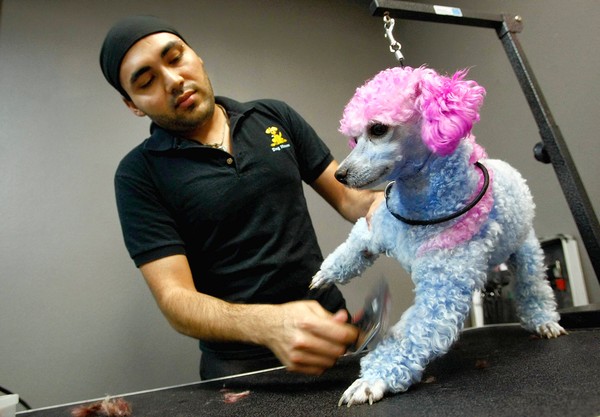 美国加州需要认证的职业数量居全国前列,连家具商、私家侦探都必须进行认证,而现在可能要轮到宠物美容师了。如果认证实施,宠物美容师可以自行选择接受900小时的培训,并支付一定的认证费用。
美国加州需要认证的职业数量居全国前列,连家具商、私家侦探都必须进行认证,而现在可能要轮到宠物美容师了。如果认证实施,宠物美容师可以自行选择接受900小时的培训,并支付一定的认证费用。
加州立法机构给出的理由是,避免可爱的小动物受到不合格宠物美容师的伤害,好让宠物的主人放心。提议的起草人瓦尔加斯说:“宠物是沉默的受害者,他们不会告诉你他们遭遇了什么。”
瓦尔加斯最初的目的是让加州所有宠物美容师通过考试,并预付赔偿金才能获得从业资格。然而由于众多美容师的反对,很多细节没有得到认可。2005年相似的立法也曾提出过,后来被搁浅了。
加州1.1万宠物美容师害怕自愿性的职业认证最终会演变成强制性的,从而给宠物服务经营的开展设置重重障碍。加州一宠物美容机构的合伙人强尼雷说:“我坚决反对,这简直就是抢钱。”
其实,在全美也有过这样的讨论,即如何进行职业认证从而保护消费者的利益,但是又不损害相关行业创业热情。大家对医生、律师等职业的资格认证没有提出异议。然而近年来近乎所有的“饭碗”都得认证了。在路易斯安那州,花匠得通过考试才能拿从业执照;在马里兰州首府安纳波利斯,算命的人也得拿执照;在密西西比州,编辫子的人还得通过卫生部门的认证。
理智基金会(一个主张自由论的智库)最新数据显示,加州有177个职业需要认证,是美国最多的,而各州的平均数量为92个。理智基金会政策分析人士萨莫斯认为,过多的职业认证会抑制竞争,提高产品和服务价格,尤其会影响低收入的服务业创业者。
如今加州失业率达10.8%,居全美第三,许多失业的加州人不得不自行谋生。评论人士认为,宠物美容室的职业认证是不利于当地经济发展的,况且宠物服务业正蓬勃发展。美国宠物产品协会表明,去年美国人在宠物美容和收容服务上花的钱达到37.9亿美元,比2010年多了2.9亿美元,而今年预计达41亿美元。美国劳工部预计,从2010到2020年,就业人数会增长23%。宠物美容师还算比较稳定的职业。
宠物美容师职业认证的立法正在接受加州众议院的审核,听证会的日期还没有确定。反对人士安德森说:“这项立法没有必要,我真不懂预算赤字高达170亿美元的政府为什么抓着这个行业不放。
California already licenses furniture upholsterers, private investigators and recreation guides.
Now it wants to regulate pet groomers.
In a state that leads the country in the number of professions requiring a license, a bill moving through the Legislature has struck a nerve among those who clip Fido and Fluffy.
Sen. Juan Vargas (D-San Diego), author of the proposed legislation, wants to provide pet owners "peace of mind" by creating a voluntary certification program. Groomers would have to complete about 900 hours of training and pay an as-yet unspecified fee to be certified by the state — a designation that amounts to a Good Housekeeping Seal of Approval.
Vargas says the measure, known as SB 969, is intended to protect pets from untrained groomers. He said he drafted the bill after learning about lacerations, broken bones — and in one case, death — that some animals suffered during trips to their barbers.
"The pets really are the silent victims," Vargas said. "They can't tell you what happens."
Vargas' initial aim was to force California's pet groomers to obtain a state license that would have required them to pass an exam and carry insurance. But that proposal lost much of its bite after facing opposition from small-business groups. A similar bill stalled in 2005.
But even the watered-down version has some groomers growling. They fear that voluntary certification is just a precursor to eventual licensing that would snag California's estimated 11,000 pet barbers in more red tape.
"I want the government out of my salon," said Johnny Ray, co-owner of the Dog House in North Hollywood. "It's just a money grab."
The dust-up underscores a larger national debate about professional licensing and how to protect consumers without stifling entrepreneurship. Few dispute the public interest in regulating surgeons, lawyers and others who could do lasting harm without the requisite skills.
But licensing has mushroomed over the years to include all manner of trades. In Louisiana, florists must pass a test to earn a license to operate. Fortune tellers in Annapolis, Md., need to be licensed to practice their crafts. And, in Mississippi, hair braiders need to be registered with that state's health department.
California has about 177 occupations requiring a license, the most of any state, according to the most recent comprehensive count by the Reason Foundation, a libertarian-leaning think tank. (A separate review by The Times found the number has stayed roughly the same since that 2007 survey.) The national average is 92, said Adam Summers, a senior policy analyst with the organization.
Summers, who has studied the rise in occupational licensing, says this type of professional regulation stifles competition, drives up prices and is particularly burdensome to low-income entrepreneurs trying to earn a living in service trades.
Some have fought back. In the late 1990s, a group of African American hair-care specialists successfully sued to overturn California cosmetology laws requiring them to undergo 1,600 hours of training and pass an exam to braid hair. A Utah hair braider currently is waging a similar fight against that state's cosmetology board.
"Mandatory licensing tends to impose arbitrary standards," Summers said. "It's a monopolist system that doesn't necessarily improve quality of services and increases the cost of business."
In recent years, tens of thousands of laid-off Californians have been forced into self-employment. Critics contend that raising barriers to entry in fields such as dog grooming is counterproductive in a state where unemployment is 10.8%, the third-highest in the nation.
The proposed legislation comes at a time when pet owners are spending more money on their furry companions. Last year, Americans spent $3.79 billion on grooming and boarding services for their pets, up from $3.5 billion the year before, according to the American Pet Products Assn. The group projects spending in 2012 will grow to $4.1 billion.
Groomers have found steady work in the animal-care industry, where employment is projected to grow 23% from 2010 to 2020, according to the Bureau of Labor Statistics.
The bill, currently working its way through the state Assembly, cleared the Business, Professions, and Consumer Protection Assembly committee last week on a 5-4 vote. It passed the Senate with a 22-14 vote, largely along party lines. It's next scheduled to appear before the Assembly Appropriations committee. No hearing date has been set.
State Sen. Joel Anderson (R-San Diego), who voted against the bill, called it unnecessary.
"Why is a state law needed to set up a voluntary certification program?" Anderson said through a spokesman. "It could all be done without the heavy hand of government, such as how the Better Business Bureau operates. One has to ask with a budget deficit of $17 billion why is the majority party focused on Fido's hair and nail care?"
Jose Miguel Nuñez, a dog groomer with four years' experience, said he opposed the bill, saying it was unnecessary and would create a distinction between groomers who sought the state's certification and those who didn't.
"I don't think the state's backing should give people more confidence," the North Hollywood resident said. "A piece of paper won't change anything.
 美国加州需要认证的职业数量居全国前列,连家具商、私家侦探都必须进行认证,而现在可能要轮到宠物美容师了。如果认证实施,宠物美容师可以自行选择接受900小时的培训,并支付一定的认证费用。
美国加州需要认证的职业数量居全国前列,连家具商、私家侦探都必须进行认证,而现在可能要轮到宠物美容师了。如果认证实施,宠物美容师可以自行选择接受900小时的培训,并支付一定的认证费用。
